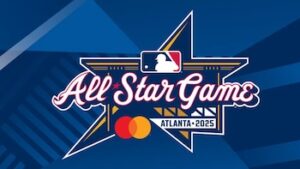
This all-star week, the Registry takes a brief look at African Americans and Major League Baseball (MLB) on this date.
Numerous successes and ongoing struggles for equity have marked Black history in the MLB. The resistant wall of the 19th century separated the races in virtually all areas of American society. Still, there have been several rather remarkable parallels in the maturation of baseball for both races. The first baseball governing board was white. The National Association of Baseball Players (NABBP) was formed in 1858. Major League Baseball was almost integrated in 1902 when legendary Baltimore Orioles manager John J. McGraw signed Charlie Grant. Grant had light skin, straight hair, and high cheekbones, but he was banned from the major leagues before the start of the season when Charlie Comiskey, the Chicago White Sox owner, discovered that Grant was Black.
Denied the chance to play in Major League Baseball, Black players instead played in the illustrious Negro Leagues. The first all-Black professional team, comprised of employees of the Argyle Hotel in New York, was formed in 1885 and later acquired by a New Jersey businessman, officially named the Cuban Giants. It was not until 1920 that an organized African American league (the Negro National League) survived a full season. Many great teams played in the Negro Leagues, with perhaps the Homestead Grays, Pittsburgh Crawfords, and Kansas City Monarchs being the most remembered. Many superstars graced the playing field. James "Cool Papa" Bell, Josh Gibson, and Leroy "Satchel” Paige. Other former Negro League players who went on to star in the major leagues include Willie Mays, Henry Aaron, Roy Campanella, Ernie Banks, Junior Gilliam, Don Newcombe, and Joe Black.
In 1943, Major League Baseball Commissioner Kenesaw Landis began integrating professional baseball and announced that any team could sign Black players. The promotion of Jackie Robinson to the Brooklyn Dodgers in 1947 not only opened the doors for other African American players, but it also signaled the end of the Negro Leagues. The Dodgers were the first to integrate, and the Boston Red Sox were the last, 12 years later. In 1970, Curt Flood of the St. Louis Cardinals shocked the baseball world and America by suing MLB and its “reserve clause,” the game's sacred clause that bound a player and his contract to a team for life.
The next milestone occurred in 1975 when the Cleveland Indians appointed Frank Robinson the first African American manager in baseball history. The last piece of the integration puzzle in Major League Baseball was including African Americans in "the front office." Bill White, a 13-year veteran with a solid but not distinguished career, was appointed president of the National League, and the number of African American managers rose.
Diversification in the front office remains a muffled concern for Major League Baseball in the 21st century. While there are 30 major league teams, representation in the front office remains low for African Americans, even lower for Latinos, who now are the second-largest block of players in the major leagues after whites. Whites own every team. With the rich Black history, past and present, there is a growing shortage of African American youth playing baseball.
According to Northeastern University's Center for the Study of Sport in Society, the percentage of African Americans in the major leagues dropped to 10 percent last season, down from 17 percent in 2003. The percentage of Latin players rose from 14 percent in 2003 to 20 percent last season. Also African
American representation in baseball is worlds behind that in the National Basketball Association (80 percent) and the National Football League (67 percent).
Reviving Baseball in Inner Cities, the RBI program was founded in 1989, four years after Dwight Gooden was the last African American player to win the Cy Young award. The 185 RBI programs worldwide are run with varying degrees of success. One of the better RBI programs is in Los Angeles, which sends youths to showcase camps and out-of-state tournaments due to the financial support of Dodgers pitcher Kevin Brown, who is white.
This century, Blacks have been inducted into the Hall of Fame, including Vladimir Guerrero, Tim Raines, Ken Griffey Jr., Barry Bonds, Dave Winfield, Reggie Jackson, Minnie Miñoso, Jim Rice, Tony Gwynn, Eddie Murray, Ozzie Smith, Kirby Puckett, Effa Manley, Barry Larkin, Andre Dawson, Tony Oliva, Buck O'Neil, David Ortiz, and Rickey Henderson.
African Americans accounted for two MLB managers, Ron Washington and Dave Roberts, and 65% of the RBI participants in 2020; now, they account for 50%. Some current African American professional players are Aaron Judge, Ke’Bryan Hayes, Michael Harris II, Lorenzo Cain, CJ Abrams, Josh Bell, Cedric Mullins, and Mookie Betts. African American players represented just 6.2% of MLB opening day rosters in 2023, down from 7.2% in 2022.
The 2025 All-Star game was played in Atlanta, and featured a special tribute went to Hank Aaron.
The Negro Baseball Leagues: A Photographic History
By Phil Dixon with Patrick J. Hannigan
Copyright 1992, Jed Clauss and Joanna Paulsen
Ameron House Publishing
ISBN 0-88488-0425-2
20th Century Baseball Chronicle
Year-By-Year History of major league Baseball
Copyright 1999, Publications International Ltd.
ISBN 0-7853-4074-2